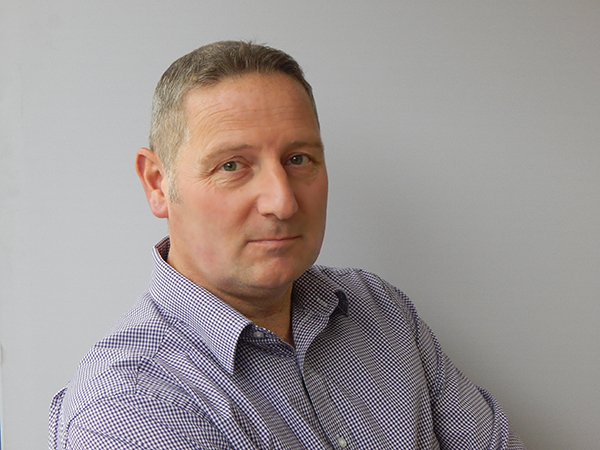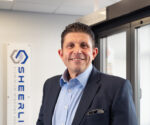Darren Woodcock, Deceuninck Operations Director

First job? Aged 17, I joined Hepworth Plc as an Injection Moulding Technician. The factory was in the centre of Wolverhampton (now a retail park) with over 1,000 workers. It was an apprenticeship for life and gave me an excellent grounding in the successful running of a large factory. I still apply the lessons I learnt there to my work today.
When did you join your current company? I moved to Deceuninck in 2016 to set up the new foiling plant. I’d worked with Rob McGlennon and Chris Jones and was excited by Deceuninck’s vision for colour.
Most useful/favourite gadget? Without hesitation it’s my iPhone combined with Audi in-car MMI technology – it lets me stay in contact when I’m travelling or commuting to work. I’d be lost without it!
Most useful/favourite website? LinkedIn is my go-to site and a great way of keeping up to speed with other companies and areas of business that interest me. I don’t contribute much to LinkedIn myself but I am planning to change this.
Recommended hotel for business? It’s got to be the Bowood Hotel Spa and Golf Resort, which is just down the road from Deceuninck. We hold our annual golf day with VBH here because the food, meeting spaces and golf are all top notch. Customers never fail to be impressed with the Bowood and many bring their partners and families back for weekends.
Favourite UK restaurant? The Herd restaurant in Bath. It’s a small, unassuming underground restaurant with around 10 tables, but one of the best steakhouses I’ve visited. If you don’t book you can’t get in!
Business person you most admire? I’ve put a lot of thought into this. There are so many inspirational figures but I admire Karren Brady for her drive, ability and commitment to get to where she has. Becoming Managing Director of Birmingham City at 23 and then the youngest MD of a UK Plc shows real acumen and determination.
Best business decision? Joining Deceuninck was like a breath of fresh air. It’s opened my eyes to what can be achieved with a like-minded and focused group of people. We’re free to speak our minds and there’s no judgement, and we all strive to get the job done well.
Working Day: Like everyone, things have changed. I used to spend a lot of time travelling to Deceuninck’s HQ in Belgium and meeting various suppliers across Europe. Now these meetings take place over the phone or by video conference. I start my daily commute at around 6.30am and use the time to speak to my European colleagues. The first thing I do when I get to work is walk round the factory to check the shop floor and say hello to whoever’s on shift. We hold a daily production meeting where we’ll catch up with the team and go over any issues that have cropped up. These meetings are vital as the site runs 24/7 and there are different challenges – and opportunities – every day. I leave work after 6.30pm and have calls with Rob McGlennon and the sales and technical teams who are also travelling home. It’s a great time to collect my thoughts and give feedback from the day.
Working Location: Deceuninck’s UK head office, manufacturing and warehouse is in Calne, Wiltshire – about an hour’s drive from my home. In usual times, I frequently travel to Belgium, Germany and Italy. Where possible I like to drive and use the Channel Tunnel. I’m still amazed by this absolute feat of engineering and the fact you can get phone signal the whole way!
The main feature…….
I joined Deceuninck in 2016 with 30 years’ industry experience. I’d worked in a variety of production roles across a number of factories, but I’d found my passion in extrusion and foiling. This matched Deceuninck’s passion and vision for colour. When I was asked to set up the new foiling plant, it was too big an opportunity to miss!
A passion and vision for colour – Deceuninck was the colour trailblazer. We saw the market changing and opportunity growing at the top premium end of the market, where homeowners want top quality, beautiful products with the ‘wow factor’ to enhance and add value to their homes.
Homeowners love colour but fabricators and installers can be nervous about selling it – perhaps because they’ve been let down by their supplier with late deliveries, or because their customers aren’t happy with long lead times. So, Deceuninck invested in colour to help customers sell with confidence. Investment started with a 140,000 ft2 warehouse to supply 26 (now 30!) colourways-from-stock across our full product range. We also wanted to take control of our supply chain and guarantee the quality of the finish. This is where I came in, with a blank canvas and a remit to develop a world class foiling plant.
Starting from scratch was a challenge but a chance to get everything right first time. Drawing on my experience of the past 30 years, we designed the plant to give the best possible foiling conditions. I know from experience the optimum temperature for foiling is 23ºC minimum, so we stick to this strict ambient temperature. We also specified high performance specialist ‘white’ lighting to allow the team to work with the most precision and accuracy. It’s usually only used in art galleries, and the contractor couldn’t believe we’d asked for it in a factory! We’ve perfected the layout too. Product comes in the right hand side and we store it in bays to properly acclimatise to the optimum foiling temperature. It then runs through the adjacent line and is left to cure. Unlike other foiling plants, no Deceuninck product is stored outside.
Customer expectations are rightly high and we need to get foiling right first time. The foiling team is trained to spot errors and all our machines have advanced sensors to check profile, adhesive and foil temperatures. If one of the temperatures is wrong, the machine shuts down. We regularly take samples of colour to check for peeling, stretching and breakages in compliance with BSI standard 7722. We run a paperless system so there’s no risk of losing job sheets, but all products are bar coded for full traceability. When you’re dealing with such high volumes of profile (which is needed to keep so many colours in stock!), you can’t afford to make mistakes.
The foiling team do their own servicing and quality checks, and fix machines in-house if one breaks down. This removes the need to wait hours, even days for an external engineer. We don’t want interruptions to service!
Teamwork is the key to every strong business – People ask what our greatest asset is and without hesitation, I say it’s the team. Deceuninck’s UK management team has a combined industry service of over 150 years and we have a real understanding of the industry and what makes it tick. As managers we lead by example to promote a positive, collaborative working culture.
It sounds boastful but Deceuninck’s 23-strong foiling team is truly world-class. They come from all over the world and share the same drive for perfection and getting the job done well. I’m a firm believer in training to empower people – you can never know too much, and each team member has a personal training plan to help us all work better.
Manufacturing challenges in the current crisis – It’s times like these that close teamwork is even more important. We are close-knit and I make a point of knowing everything about my staff to help them work to the best of their ability. Deceuninck’s extrusion and foiling is currently running at reduced capacity but we’re still able to offer the same service. In anticipation of the Government lockdown we worked like crazy to build stock levels, putting us in a strong position as the market starts to recover. Deceuninck profile is extruded and foiled in 6m lengths so we’re essentially set up for social distancing, but of course we’ve taken further measures to ensure the safety of staff. We’ve also issued guidance, literature, and PPE to customers as they return to work.
There are big challenges ahead, but also opportunities to learn and improve. Agility is my keyword as we balance reduced capacity with maintaining stock levels and doing as much as we can to help customers. It’s not unknown for us to turn around a customer’s order in a few hours in exceptional circumstances. Supply chains are elongated so we’re checking stock reports several times a day and modelling stock reports to 75%, 50% and 25% capacity to predict which products and colours are selling well. It’s a challenge because one big, unexpected order has a big impact on stock levels and that’s where close collaboration with the sales team and production planners is vital to anticipate customer demand.
We’re seeing positive signs of recovery and most of our customers are back at work. Fabricators are reporting strong enquiries and Deceuninck sites across the rest of Europe are slowly building capacity, which is encouraging for the UK too. Despite all the turmoil, we’re confident about the future. The old Nationals’ selling model is a dying breed and the crisis will accelerate a more professional style of selling – in the immediate term remotely, and with software that lets people visualise new windows and doors in their homes. Homeowners want products that enhance their homes, in looks and performance, and fabricators and installers want the support of a reliable supplier. Brands that offer quality products and reliable, robust supply chains will do well. Deceuninck set the standard for colour in choice and lead times, and we’ll continue to improve. We’re still pushing ahead with three new extrusion lines because we’re confident our sales will continue to grow.











